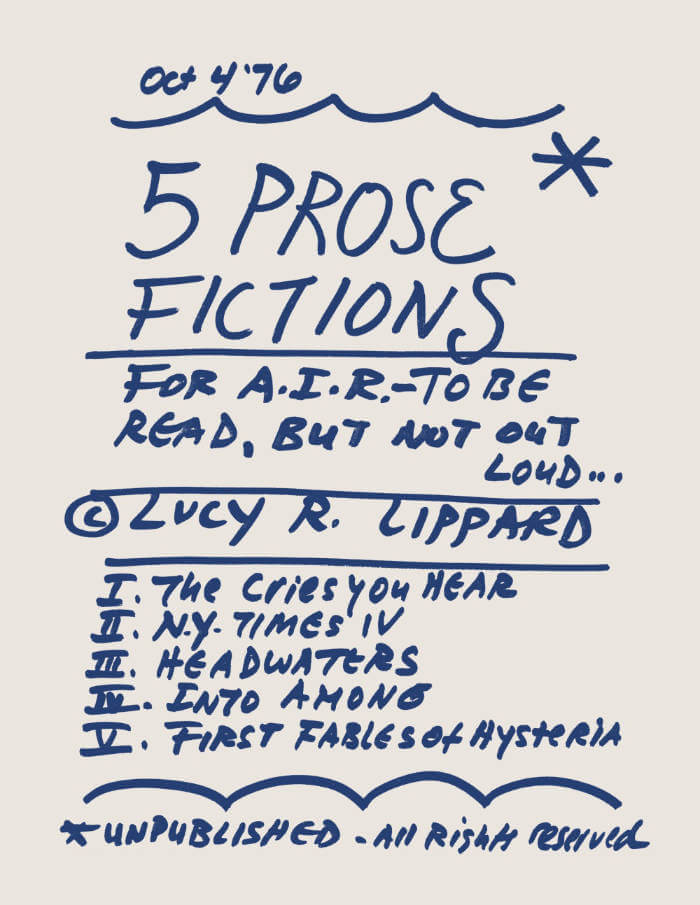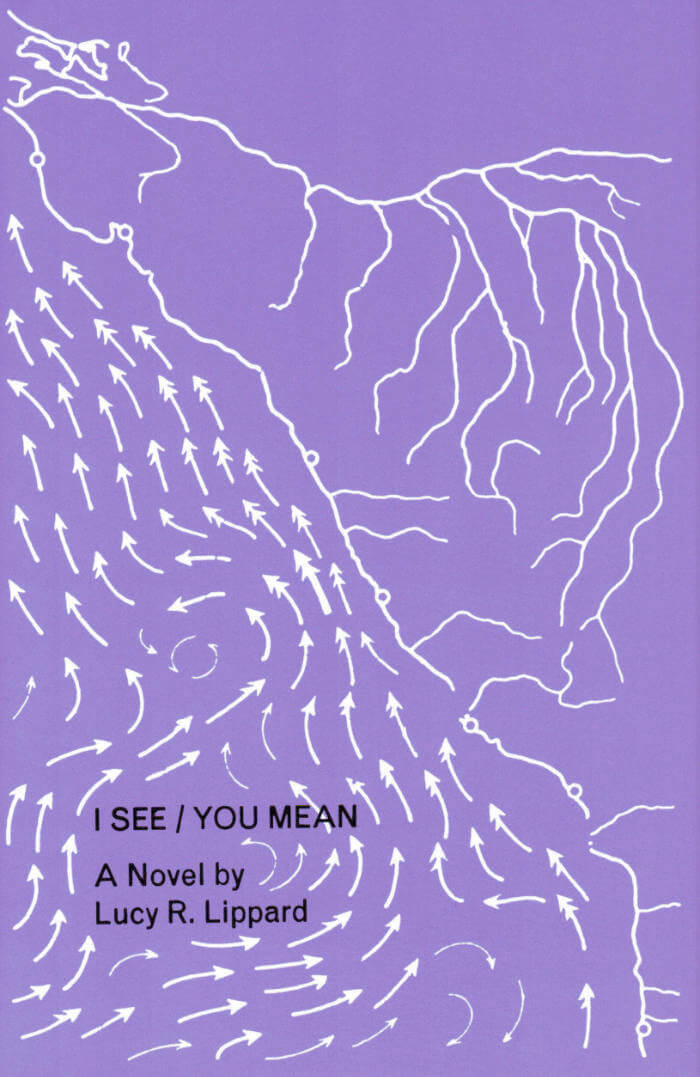New Documents
New Documents

Headwaters And Other Short Fictions
Compiling works from nearly five decades, Headwaters (and Other Short Fictions) provides the first comprehensive overview of the narrative and experimental writing of Lucy R. Lippard. While she is best known for her pioneering work as an art writer and activist, Lippard’s fiction helps frame her broader impact on contemporary culture.
Headwaters anthologizes over fifty short works, many previously unpublished. These often experimental vignettes showcase the range of her literary voice while also challenging our understanding of her oeuvre. Sometimes speculative or fragmented, yet always compelling, these pieces range from short-form narrative stories and conceptual fiction to visual essays and political prose.
Included are excerpts from two never-released novels, as well as collaborations with artists Robert Barry, Sol LeWitt, and Jerry Kearns.
Lucy Lippard is author of thirty books on contemporary art and cultural criticism. She has curated some fifty exhibitions in the United States, Europe, and Latin America.
Edited by Jeff Khonsary

5 Prose Fictions
Originally self-released in 1976 through A.I.R. Gallery, New York, the five short unpublished manuscripts collected in 5 Prose Fictions offer an abbreviated introduction to curator Lucy R. Lippard’s largely under-examined fictional work.
The republication of these pieces follows the recent rerelease of I See / You Mean and provides further context for the released of Brimstone this Fall, an anthology compiling over 50 of Lippard’s experimental and narrative fiction works from the early 1950s through the 1980s.

New Forms of Art and Contagious Mental Illness
Over the years 1919–20, the celebrated medical scientist and doctor Carl Julius Salomonsen began giving public lectures and publishing pamphlets regarding a new “epidemic” that had begun to affect the European populace: the increasing ubiquity of modernist art.
In a 1919 pamphlet titled New Forms of Art and Contagious Mental Illness, he wrote: “We stand, at this moment, before a movement in art which is psychopathic in character, and whose victorious journey through all countries is probably caused by the same spiritual disease that gave the older, religious spiritual epidemic such a powerful spread.” This pamphlet and the accompanying talks were countered by a retaliatory pamphlet published by members of Grønningen, a Copenhagen modernist painters group, to which Salomonsen responded with a further pamphlet.
Translated into English for the first time by literary theorist Andrew Hodgson, the entire altercation is gathered in this book, documenting one of the earliest rejections of modernist art.
Edited & Translated by Andrew Hodgson.

I See / You Mean
I See / You Mean is an experimental novel about mirrors, maps, relationships, the ocean, elusive success, and possible happiness. Through a collage of verbal photographs, overheard dialogue, sexual encounters, found material, and self identification devices (astrology, the I Ching, palmistry, Tarot), it charts from past to future the changing currents between two women and two men: a writer, a model/stockbroker/maybe dictator, a photographer, and an actor. A lot happens between the lines. Art critic Lucy Lippard wrote this novel in 1970 and became a feminist in the process: “I started writing and realized I was ashamed to be a woman. Then I had to find out why. Then I got very angry. The fragmented visual form came out of contemporary art and the conflicting emotions of 1960s political confrontation; they suggested a new way to put things back together—an open-ended, female way that didn’t pretend conclusions.”
Lucy R. Lippard is a writer, activist, and curator. She is the author of twenty-five books on contemporary art and cultural criticism and has curated some fifty exhibitions in the United States, Europe, and Latin America.
Afterword by Susana Torre
Edited by Jeff Khonsary

Yes, But Is It Edible?
Robert Ashley, Alex Waterman and 1 more
Some years ago, Will Holder and Alex Waterman proposed to Robert Ashley that musicians and non-musicians might produce new versions of his operas, by way of typographical scores. The bulk ofYes, But Is It Edible? is a result of that proposal: scores for Dust (1998) and Celestial Excursions (2003). These operas’ characters have, until now, been solely produced by and are the stories exchanged between Ashley and his “band” (singers Sam Ashley, Joan La Barbara, Thomas Buckner, and Jacqueline Humbert); and in landscapes produced by “Blue” Gene Tyranny, Tom Hamilton, David Moodey, Cas Boumans, and Mimi Johnson—the result of a thirty-year relationship.
The scores for Dust and Celestial Excursions are preceded by a selection of Ashley’s work, from 1963 to 2008, drawing attention to the varying relations between instruction and score, and the tones of instructional address. Working with these scores gave us a better sense of how each one produces a specific mode of decision-making, telling us what to put on the pages of the scores, for any reader who follows.
Yes, But Is It Edible? is the fourth in a series of publications produced with or by Will Holder and Alex Waterman that a musicological perspective on scoring speech, and the role of printed matter in collective forms of reading and writing: Agape (Miguel Abreu Gallery, 2007); Between Thought and Sound (The Kitchen, 2008); and The Tiger’s Mind (with Beatrice Gibson; Sternberg Press, 2012).